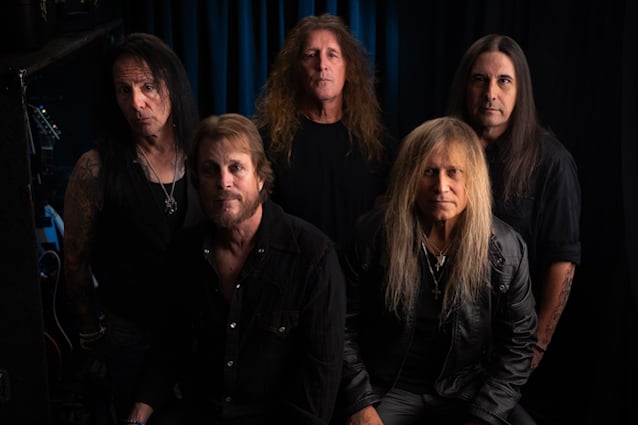Transgender singer Mina Caputo — once known as Keith Caputo, the front-person for the popular rock band LIFE OF AGONY — has opened up about her decision to “detransition” and change her name back to Keith Caputo. Detransitioning is the process of stopping or reversing gender transition, whether it be social, medical, surgical or legal changes.Last November, Mina revealed that she will be living life as a male again, claiming her gender dysphoria “has been cured” and announcing she had already started the process.Caputo, who was born in December 1973 and began identifying as Mina in 2008 before publicly coming out as transgender in 2011, discussed her detransition process in a recent interview with Buck Angel. Mina said in part (as transcribed by BLABBERMOUTH.NET): “I felt like I was doing a disservice to the world because I’ve been medically not on hormones for about six or seven years now. I took myself off of hormone therapy in 2016, because after roughly 17 years of being on hormone therapy, it was incredibly, incredibly difficult for me. And I went on hormone therapy even after male puberty. I can’t even imagine what hormone therapy would be like for a child before puberty. Let’s just face it, as children, we all go through some kind of identity disorientation. Some things stick to us and some things just work themselves out through time, and that’s why I don’t think hijacking these little spirits, these little humans is really… I think there’s a lot of malpractice going on.”Just the other day I released to my fans, I really wanted to talk about the elephant in the room and that’s me not being on hormones anymore,” Mina continued. “And I was in limbo. I was in limbo for these six, seven years, because as I started becoming more and more of my divine male self, my body changing, my facial hair, everything changing, my psychological, my spiritual, my intellectual, my emotional, everything really changed and I really went back to a very clear self, a clarity I’ve never even experienced before. ‘Cause I didn’t do any antidepressant. I’m not on any drugs. I smoke pot. I do mushrooms once in a while. But I do no alcohol. I’m on no pharmaceutical drugs. Actually, the hormone therapy was really doing such a disservice to my nature that I knew for years that I was fighting the nature codes. You can’t fight the nature codes. And every day it just got worse — the rashes, the migraine headaches. My libido was robbed from me. I’m a very sensual, sexual person — I always was. My libido was stripped from me. I had no fun. I was always depressed. Maybe I’m mislabeling it, but I felt more of a gender anxiety and depression while being on hormone therapy. I thought I was doing myself a service, man, but after all the years, I was torturing myself. And then to protect all these ideologies that I had about myself being trans and being a non-gender-conforming child, which I’ll always be… But there’s more of a clarity now. I’m walking in a more healed version of myself.”Despite the fact that studies and medical professionals consistently report that the vast majority of individuals who transition do not regret their decision, Mina insisted that “what people don’t realize is that gender dysphoria in a lot of people later on in life, it works itself out. And people — of course, the white coats, the therapists, the clinicians, the sexologists, the therapists, the endocrinologists, the surgeons, they don’t wanna hear people like me say these things work themselves out.”The reason why this is so important is because I have now shared with the world that I’ve been off of hormones,” Mina continued. “And now I reached a point where it’s, like, ‘Oh, shit.’ What I wanted to do was, like, okay, I took myself off the drugs. And I said to myself, ‘Let me just see how many months or years I can actually get away with this before I might have to, basically, call my surgeon and take my fake boobies out.’ And now I feel like I’m at a point where, obviously, I’m totally simmering in my divine male self. Of course, that feminine self is there, but what happened was, after all the years of hormone therapy and realizing that it was actually doing more harm than good for me — for me. My personal journey.”Before anyone judges me or calls me anti-trans or anti-proper care or treatment, I’m talking about me,” Mina added. “I’m a very intuitive person. I knew that the drugs were only making things worse with all the list of side effects that made my journey tumultuous. It actually took all the fun, all the connection to what I had with my feminine self, all that kind of just started dissipating because I spent more time on my couch crying, depressed, filled with anxiety. I stopped going out. I became more of a recluse than I actually am, because I’m a singer, I’m a songwriter, I’m an artist. Isolation, self-reflecting, meditating, going deep within is all part of my journey.”Thank God my parents didn’t bring me to any clinics or therapists of today because here I am at age 51. I’m now going back to my authentic self, my authentic gender, that I’m now comfortable in my body.”Gender dysphoria is the condition of feeling one’s gender identity to be at variance with the gender they were assigned at birth.By the time a transgender teenager comes out or begins to transition, they likely have lived in a body that doesn’t match their sense of self for years.”Listen, we all have body issues,” Mina said. “We all have some kind of body dysmorphism or disorientation, even biological young girls. They’re all filling up their face with fillers. This is also a disorientation. This is also something going on in the mind. This whole species is quite traumatized. The systems in place are designed to traumatize everybody. I was traumatized as a child. My mom died at 20. I never knew the womb I came from. It makes total sense why I grew up with my grandmother, my aunt, my grandma to put makeup on me. I loved watching her do it in the mirror.”I’m not 100 percent cured,” Mina admitted. “I know I have this feminine energy inside of me. I could play. I can do whatever I want. If I have a new lover and he wants me to play the the woman, I will. I’m open. I’m an open book. This is who I am. I’m a rebel at heart. I’m feral. I’m a fucking nonconformist at heart. That’s why I played with my gender to begin with. But I really did have mental issues. I really grew up traumatized. I grew up abused by all the men. My grandfather was very abusive. All the men in my family were very abusive. All the women, they were gentle. They were nurturing. They were sensual. They were intelligent. So as a child, I wanted to be that.”Circling back to her decision to take herself off hormone therapy less than a decade ago, Mina explained: “I’m never gonna change the face. We’re never doing that. So what’s the fucking point? So what just recently happened is that I was stuck in some kind of limbo for the past four or five years. I finally leveled up. I made decisions for myself. I called my surgeon. I already have my consultation. I got my date, January 28th. I’m going to be living in my full male capacity. I’m taking the fake boobs out. Because you know why? I feel like I found my mental health. And you know what the dysphoria turned into now? Getting them out. Now when people call me Mina or she, now I’m experiencing that same dysphoria. And there was a whole reversal, a whole clarity. And being on hormones that long, it showed me how it wasn’t serving me… I’m going back because of all this clarity. And you know what? Once I started making affirmative decisions for myself, I’m so very sure about the decisions that I’m making today for my body and my mind. And I won’t allow anyone to dim my light, dim my shine, not talk about what I’ve been through.”From 1989 to 2006, Mina performed and recorded under her birth name, Keith Caputo. In 2008, she began her transition and eventually made her debut as Mina on her 2013 solo album, “As Much Truth As One Can Bear”. She has since recorded another solo album (2016’s “Love Hard”) and two more albums with LIFE OF AGONY.According to Xtra, numerous peer-reviewed scientific studies have shown that less than one percent of the trans people who receive these surgeries regret their decision to do so. By comparison, somewhere around 14.4 percent of patients who receive other forms of surgery regret their operations.Two days after the 2024 U.S. presidential election, Mina took to her Instagram to say that she wanted Donald Trump to win because of his plan to “stop the chemical, physical and emotional mutilation of our youth” and promise to “revoke Joe Biden’s cruel policies on so-called ‘gender affirming care’ — a process that includes giving kids puberty blockers, mutating their physical appearance, and ultimately performing surgery on minor children.”According to USA Today, Trump made gender identity issues a focal point of his campaign, targeting transgender rights in a barrage of TV advertising, speeches and campaign rallies and indicating that elimination of those rights would be among the initial priorities of his term.[embedded content]
/
January 7, 2025
LIFE OF AGONY’s MINA CAPUTO On Decision To Detransition: ‘I Went Back To A Very Clear Self’







